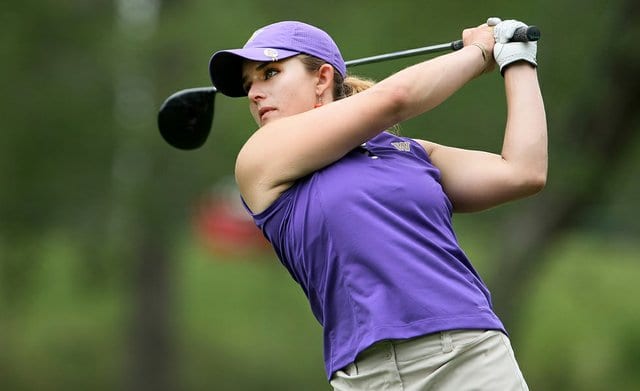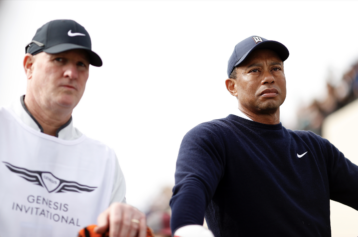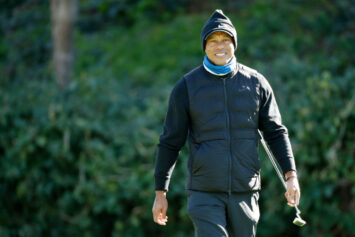Golf has a sordid history with sexism. For those familiar with the sport, this is not news. For those embedded in the sport, its sometimes easy to forget or overlook.
As a young girl who grew up in the golf world, I was oblivious to what sexism looked like. I did not realize how even a slight jab towards my gender, such as, Goodness, you hit it far for a girl, was embedded in the thought that it was unbelievable that a woman could keep up, let alone, hit further than many of my male counterparts.
I never countered such statements. I just accepted it and moved on, and much to my detriment.
My evolution into feminism has been a long journey, one greatly influenced by my upbringing in the bible belt of Oklahoma and time spent in conservative churches. But what really impacted me, without knowing it before reflection, was my time as a competitive golfer.

Between the ages of five and twenty five, I played competitive golf. Junior leagues took up my summers and then I later found myself playing on a full-ride at the University of Washington. Soon after college, I turned professional, playing on the LPGA and the developmental tour.
Growing up, I typically was the only young girl at the course and often had to play with men much older than me. In middle school, a girls golf team didnt exist, so I played on the boys squad. I quickly learned the rules early on of how to be one of the guys.
I laughed at jokes that made me uncomfortable, dismissed sexist comments, and did not think twice about the fact that some of the courses I played restricted women playing alone at certain times, unless they had a male partner.
Golf has a history laced with misogyny and the industry itself has done very little to dismantle the sexist attitudes and practices within the sport. Male only golf courses still exist to this day. Most recently, Muirfield Golf Club in Edinburgh, Scotland voted to uphold its ban on female members. The course where Olympic golf will be played in Tokyo, Japan in 2020 does not allow female members.
And lets not forget that the United States Golf Association decided to still hold its Womens U.S. Open at Donald Trumps course this year in New Jersey, despite every nasty and horrible thing he said about women, including grabbing them by their genitals.
The majority of golfers are white males, and its ties to elitism are so deeply rooted that to challenge it disrupts the entire foundation on which golf was built. Currently, only 20 percent of women make up the golf population in the U.S. and its an area that the game struggles to grow. For women of color, less than two percent make up those who play.
My privilege to play golf affected my political views on social issues like economic inequality. Not until recently though, did I begin to realize how it affected my feminism.
I grew up accepting poor behavior from men on the course because I did not want to rattle the cage. Parts of me felt lucky that I was extended the privilege to play at some of these elite golf courses, and better yet, play with the men.
The pride I felt that I was one of them helped me overlook the very things in golf that make it inaccessible and distant in its appeal.
For instance, look at the pages of many aspiring female professional golfers on instagram. There is an influx of young girls who sex themselves up to amp up the numbers of followers they get. Like any other sport, sponsorships for female professional golfers hardly exist, but the chance of receiving some type of sponsor increases with your social media following.
And the golf industry plays into the insecurities of these young female golfers, taking advantage of their sexuality to promote golf in a sexy way. Theyll use the images of the young golfers for their pages, then quickly move on to the next hot golfer.
When I played professionally, I succumbed to this mindset for a brief period, posting provocative photos in the hopes that it would drive page views and in turn, help me clinch a sponsor. This always unsettled me though, and I removed the pictures as quickly as I posted them.
As a young junior golfer, I paid no attention to comments like, Shouldnt you be hitting it from the ladies tees? Nor did I fight back when I was often sent home from golf courses for my shorts being too short, despite them hitting just two inches above my knee.
During my time as a professional, I was often asked questions like, Do the girls hook up on tour?
These questions as an adult woman pursuing a professional career bothered me. Thankfully, the four years spent in the progressive thinking hub of Seattle during college gave me insight into how ridiculous it was that I had to tolerate sexism simply to get by.
With a better sense of self-worth, I began to stand up for myself and shut down sexist comments immediately.
Even with this sense of self-awareness though, I did not understand how to this day golf affects how I view myself as a woman in the world.

Two years ago, I left golf to pursue a career in journalism. While visiting a fellow journalist friend a few months ago, we discussed an incident with a college football coach, who had called his players little girls after a loss.
My friend, who happens to be male, expressed disappointment in the coach for playing into the stereotype that little girls arent tough. I defended the coach, stating that political correctness was ruining the country.
But as the months progressed and Donald Trump won the Republican ticket, it became even more clear how deeply rooted misogyny is in our culture, and I began to wake out of my slumber. I felt terrified that someone so open in his misogyny was given a free pass, just as I had given that Texas coach a pass on his.
While I have written on many issues concerning sexism, particularly in sport, I cant help but wonder if the nagging voice of men telling me growing up that, Women arent as good of athletes, translated to a deep-seeded inner belief that women should not fight, but rather tolerate.
And despite being an advocate for womens sports, every so often , I stumble. Instead of calling out sexist behavior I simply sideline it as though its not a big deal. But in reality, permitting bad behavior, even at its slightest form, makes it more difficult to fight.
This past year though, and particularly since Trump was sworn in, as I see more women come together in support of one another; as I witness more women use their voices to create social dialogue and change; and as more women have decided to run for public office, I see myself in all the women there fighting against the very misogyny I had to tolerate as a young girl in golf.

I see these women saying, Your thoughts, feelings, and opinions matter.
Each day, as I encounter more women battling in the crusades against misogyny and sexism, I try to grasp onto their energy, and stuff it into the pockets of my heart.
Perhaps I am more woke as the kids say these days. Perhaps Im exhausted and no longer have the energy to not care.
As I continue to navigate how I will make an impact, I am thankful for the women around me who challenge me to do and be better. Im thankful that they force me reexamine the things that initially made me feel like I didnt matter, even if it means confronting the culture of a sport that has given me so much.
Im still working on how I will make an impact, one that is as effective as it is evergreen.
The question for me remains, where to begin?




